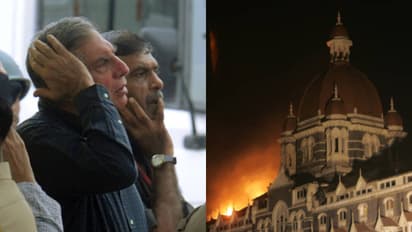How did Ratan Tata demonstrate unwavering resolve during the 2008 Mumbai terror attack?

Synopsis
After the 2008 terrorist attack on the Taj Hotel, Ratan Tata ensured comprehensive support for the families of employees who lost their lives. He also prioritized the education of the children of the deceased, ensuring they had access to quality schooling.
Ratan Tata, the distinguished industrialist and chairman emeritus of Tata Sons, passed away on Wednesday evening at Breach Candy Hospital in Mumbai at the age of 86. He died at 11:30 PM after being in intensive care since Monday. A highly respected figure in India’s business sector, Tata's legacy in industry and philanthropy has made a lasting impact on the country.
The 26/11 attacks in Mumbai in 2008 had a profound impact on the city and its residents, including Ratan Tata, the then chairman of the Tata Group. During this tragic event, the iconic Taj Mahal Palace Hotel, a property owned by the Tata Group, was one of the primary targets of the terrorists.
On the evening of November 26, 2008, ten fidayeens from Lashkar-e-Taiba launched a devastating terrorist attack in Mumbai, a city renowned for its financial strength, vibrant life, and cultural spirit. Key locations targeted included the Leopold Cafe, Chhatrapati Shivaji Maharaj Terminus, the Taj Mahal Tower, Hotel Oberoi-Trident, Chabad House, Cama Hospital, and Albless Hospital.
During the 60-hour siege from November 26 to 29, 2008, the attack resulted in the deaths of 166 individuals and left over 300 others injured. On November 29, 2008, the National Security Guard and Mumbai Police secured the iconic Taj Hotel, marking the conclusion of the attack.
At the age of 70, Ratan Tata, then Chairman of Tata Sons, displayed remarkable determination during the crisis.
Throughout the day, he remained at the Colaba end of the iconic Taj Hotel, observing the ongoing operations while the media reported from the nearby Gateway of India. At times alone and at other times accompanied by aides and staff, Tata was often seen engaging with security personnel. The Taj Hotel, overlooking the Gateway of India, stands as a significant landmark in Mumbai.
Ratan Tata stood resolutely outside the Taj Hotel as it was engulfed in flames during the terrorist attack. His actions underscored his commitment to his own safety. In the days that followed, Tata took it upon himself to fulfill his responsibilities by visiting employees injured in the attack at the hospital and supporting those who lost their loved ones. His philanthropic efforts did not stop there.
He initiated the formation of a crisis management team to provide immediate assistance, which included medical care for the injured, temporary housing for employees and their families, as well as pensions and help in finding new employment. Furthermore, when the Taj Hotel underwent renovations after the attacks, Ratan Tata ensured that not a single employee was laid off and that all staff continued to receive their salaries during that period.
In December 2008, just a month after the attack, the Tatas established The Taj Public Service Welfare Trust (TPSWT) to offer humanitarian assistance during disasters.
The families of each Taj employee who lost their lives in the attack received financial support ranging from Rs 36 lakh to Rs 85 lakh. Additionally, these families were paid their full salaries up until the date of retirement. Ratan Tata also made sure that the children of the deceased employees had access to quality education.
The families of each Taj employee who lost their lives in the attack received financial support ranging from Rs 36 lakh to Rs 85 lakh. Additionally, these families were paid their full salaries up until the date of retirement. Ratan Tata also made sure that the children of the deceased employees had access to quality education.
Ratan Tata's enduring love for Dogs: A symbol of his humanitarian spirit
Stay updated with the Breaking News Today and Latest News from across India and around the world. Get real-time updates, in-depth analysis, and comprehensive coverage of India News, World News, Indian Defence News, Kerala News, and Karnataka News. From politics to current affairs, follow every major story as it unfolds. Get real-time updates from IMD on major cities weather forecasts, including Rain alerts, Cyclone warnings, and temperature trends. Download the Asianet News Official App from the Android Play Store and iPhone App Store for accurate and timely news updates anytime, anywhere.